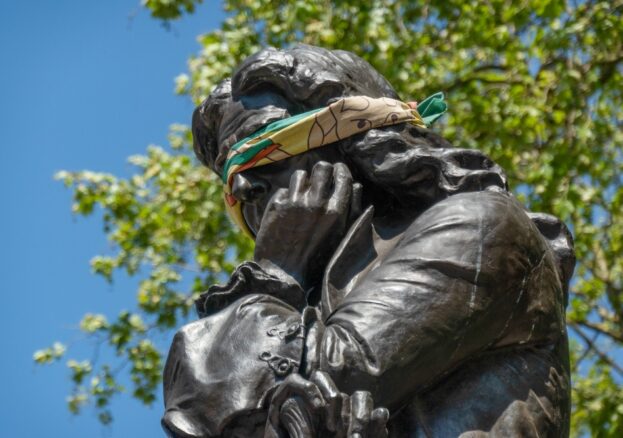
One year after the acquittal of the Colston Four – a free, new augmented reality (AR) mobile app launched in the city to offer the public an opportunity for a closer, interactive look at its links to the transatlantic slave trade, its effect on communities within the city and the expansion of Britain’s colonial rule.
Decolonising Memory is an immersive experience informed by the citizens of Bristol. App users are taken on a journey through the streets of Bristol to explore through AR a reimagined cityscape responding to colonisation through new works of 3D visual art, film, music, spoken word, movement and storytelling.
Decolonising Memory allows users to see and interact AR as if they were physically present through the lens of their smartphone. People can simply download the app to engage with compelling content, which reveals colonial history and told from an African-centred perspective.
Taking a bold step towards imagining a decolonised city and re-examining contentious locations and landmarks like the Colston statue, the app was three years in the making after Creative Director, Kwesi Johnson approached the then Lord Mayor with an augmented reality version of the text on the Colston statue plaque. The immersive experience was designed by The Cultural Assembly in collaboration with former Lord Mayor Cleo Lake, Prof Jessica Moody from the University of Bristol and Bristol Citizens Researching Together.
Over the course of the last year, a series of events and workshops across the city were designed to facilitate a dialogue of atonement, reconciliation and learning. Led by local experts and community leaders, the events provided an opportunity for local artists, activists and people to come together to engage with these issues in a safe and supportive environment.
Kwesi Johnson said, “This is purpose-driven work, where AR-extended reality and creative technology can present a different view of the city. It became a response to the recent events in Bristol that had been brewing for many years and channels that response into something that everyone can access, and that can make a real impact.
“Whether you are a lifelong resident or a first-time visitor to Bristol, Decolonising Memory is a must-see for anyone interested in discovering more about Bristol’s heritage from a different perspective. It explores hidden stories within the city’s landscape, inspiring those who take the journey, to engage with the past and present in a more meaningful way.”
Maya Alexander, Director of The Cultural Assembly said, ”We hope the reaction to Decolonising Memory will be a positive one. The immersive journey is an opportunity for the city to promote understanding and equity, through conversation. People can connect, and be resilient as they stand together exploring the streets of Bristol with a new perspective.”
Download the app, currently available on Android on Google Play Store and will be available on iphone app store shortly. www.decolonisingmemory.co.uk/app
